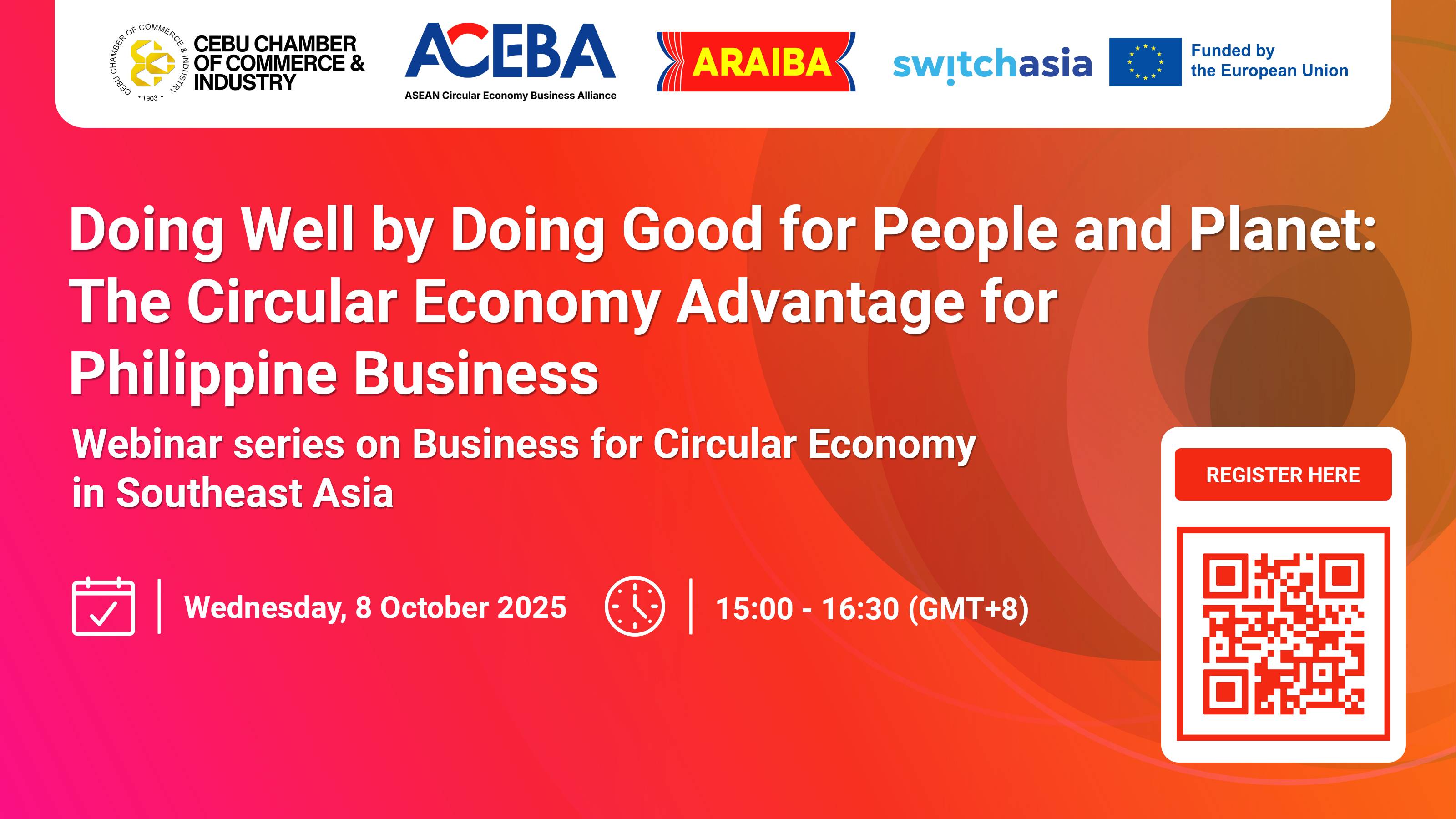
WHEN: 8 October 2025 I TIME: 15:00 – 16:30 PM (GMT+8) I Watch the recording here
Background
Southeast Asia has committed to transition to the Circular Economy to support resilient economy, sustainable growth, and resource efficiency, through the regional 2021 ASEAN Circular Economy Framework[1]. This is complemented by national policy and action plans in the Philippines for example the Philippine Action Plan for Sustainable Consumption and Production[2], the Extended Producer Responsibility regulation and sustainable public procurement initiatives. Leading businesses and other organisations in the Philippines and elsewhere in the region have started to benefit from the adoption of Circular Economy practices in sectors as diverse as hospitality, building materials, agri-food, textiles and recycling and resource recovery.
The ASEAN Circular Economy Business Alliance (ACEBA)[3] has been launched in 2024 to further facilitate business leadership and action on Circular Economy in support of stated national and regional policy objectives. ACEBA engages businesses through advocacy, knowledge and experience sharing, provision of actionable tools and insights and networking. The Cebu Chamber of Commerce and Industry (CCCI) has assumed the role of country lead for ACEBA in Philippines[4].
This webinar of ACEBA and CCCI with support from the EU SWITCH Asia Policy Support Component (PSC)[5] will focus on navigating the Circular Economy for business. It will showcase practical ways businesses are performing well and doing good for climate, people and society.
CIRCULAR ECONOMY: A RESPONSIBLE BUSINESS AND INNOVATION OPPORTUNITY
Circular economy takes a system’s perspective on the use and disposal of materials and other natural resources in the economy and society, to bring both the net inflows and net outflows of natural resources as close as possible to zero[6]. For business, this involves taking responsibility to minimize the impacts on the environment of the use and disposal of materials, energy, water, and possibly other natural resources, in its products, services, and business operations, taking a life cycle perspective. This requires innovation in products, services and processes, towards circular value chains, that use materials and other natural resources in closed loops, efficiently and extendedly, whilst also capturing the benefits of renewable materials and energy.
Beyond the necessity to tackle the interrelated climate, nature and pollution crises, the circular economy provides a solid platform for businesses to perform well - through cost savings, new business opportunities, and improved resilience and preparedness – and do good – for the planet and people. The practical business value of Circular Economy is evident from select business cases in Lao PDR and elsewhere in the region[7].
FOSTERING BUSINESS LEADERSHIP AND ACTION ON CIRCULAR ECONOMY
Circular Economy continues to have different interpretations among businesses, policy makers and other stakeholders, impeding concerted efforts towards its overarching ambition for sustainable extraction, use and disposal of materials and other natural resources. To counter this challenge and galvanize business leadership, ACEBA with extensive input from businesses and other stakeholders around ASEAN, developed a Framework for Business Action on Circular Economy in Southeast Asia[8].
The Framework offers five guiding principles for business and other organisations to drive an impactful Circular Economy transformation, in short:
- PURPOSE: advancing net zero for climate, nature, and environment;
- SCOPE: implementing resource circularity, resource efficiency, and resource substitution;
- RATIONALE: assuming responsibility for the organization’s impacts on the environment and society;
- MEANS: ideating and co-creating circular solutions; and
- DEVELOPMENT CONTRIBUTION: creating net benefits for society and the economy.
WORKING AGENDA
|
15:00 – 15:05 |
Introduction, programme overview and webinar guidelines |
Mary Grace SANTOS, national expert, EU SWITCH-Asia PSC |
|
15:05 – 15:10 |
Opening Remarks |
Thomas THOMAS, Co-convenor ACEBA, Chairman ARAIBA Sdn Bhd, and senior expert, EU SWITCH-Asia PSC |
|
15:10 – 15:15 |
Opening Remarks |
TBC, Cebu Chamber of Commerce and Industry |
|
15:15 – 15:35 |
Understanding Circular Business
|
Rene VAN BERKEL, co-convenor ACEBA, senior expert EU SWITCH-Asia PSC, and faculty Thammasat University |
|
15:35 – 15:40 |
Video: Business for Circular Economy in Southeast Asia |
ACEBA |
|
15:40 – 15:50 |
Circular Economy: Doing Well by Doing Good for People and Planet
|
Thomas THOMAS |
|
15:50 – 16:20 |
Philippine Business Experience Sharing ACEBA business cases:
|
Panel moderated by Gil Gonzales, co-convenor ACEBA |
|
16:20 – 16:25 |
Reflection and ways forward |
Rene VAN BERKEL |
|
16:25 – 16:30 |
Closing remarks |
Dr. Zinaida Fadeeva, Team Leader, EU SWITCH-Asia PSC |
[1]https://asean.org/wp-content/uploads/2021/10/Framework-for-Circular-Economy-for-the-AEC_Final.pdf
[2] DEPD (2023), Philippine Action Plan for Sustainable Consumption and Production, Department of Economy, Planning and Development, Government of Philippines, https://depdev.gov.ph/wp-content/uploads/2023/01/Philippine-Action-Plan-for-Sustainable-Consumption-and-Production.pdf
[3] www.aceba.co


